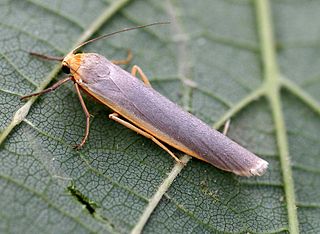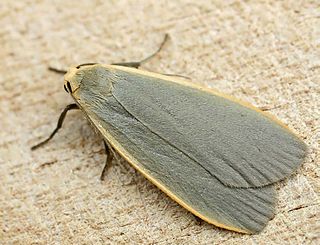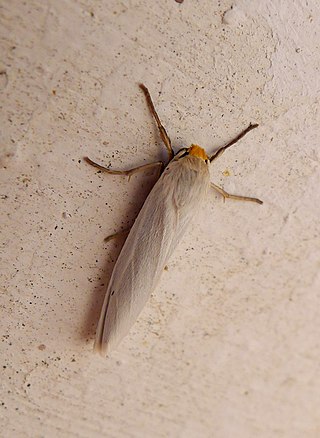
The skimmers or perchers and their relatives form the Libellulidae, the largest dragonfly family in the world. It is sometimes considered to contain the Corduliidae as the subfamily Corduliinae and the Macromiidae as the subfamily Macromiinae. Even if these are excluded, there remains a family of over 1000 species. With nearly worldwide distribution, these are almost certainly the most often seen of all dragonflies.

The common footman is a moth of the family Erebidae. The species was first described by Johann Leopold Theodor Friedrich Zincken in 1817. It is distributed throughout Europe and east through the Palearctic to Lake Baikal.

Jules Pierre Rambur was a French entomologist.

Pyrgus is a genus in the skippers butterfly family, Hesperiidae, known as the grizzled skippers. The name "checkered" or "chequered skipper" may also be applied to some species, but also refers to species in the genera Burnsius and Carterocephalus. They occur in the Holarctic with an additional group of species extending to the Neotropic.

The insect family Coenagrionidae is placed in the order Odonata and the suborder Zygoptera. The Zygoptera are the damselflies, which although less known than the dragonflies, are no less common. More than 1,300 species are in this family, making it the largest damselfly family. The family Coenagrionidae has six subfamilies: Agriocnemidinae, Argiinae, Coenagrioninae, Ischnurinae, Leptobasinae, and Pseudagrioninae.

Uniola is a genus of New World plants in the grass family.
Capissa is a monotypic tiger moth genus in the family Erebidae. It was previously treated as a synonym of Eilema. Its only species, Capissa vagesa, is found in the north-western Himalayas, Kashmir, Nepal and Upper Myanmar. Both the genus and species were first described by Frederic Moore; the genus in 1878 and the species in 1860.

Eilema is a genus of moths in the subfamily Arctiinae. The genus was erected by Jacob Hübner in 1819.

Manulea complana, the scarce footman, is a moth of the family Erebidae. The species was first described by Carl Linnaeus in his 1758 10th edition of Systema Naturae. It is found throughout the Palearctic region.

Collita griseola, the dingy footman, is a moth of the family Erebidae. The species was first described by Jacob Hübner in 1803. It is found in Europe and North and South-East Asia.

Wittia sororcula, the orange footman, is a moth of the family Erebidae. The species was first described by Johann Siegfried Hufnagel in 1766. It is found in Europe, Anatolia and further east across the Palearctic to southern Siberia and the Amur basin to China.

Eilema caniola, the hoary footman, is a moth of the family Erebidae. The species was first described by Jacob Hübner in 1808.

Manulea palliatella is a moth of the family Erebidae. It is found in southern, central and eastern Europe, Asia Minor, Iran, Afghanistan, Central Asia, Kazakhstan.

Eilema lutarella is a species of moth in the family Erebidae. It is found in North Africa through Central Europe up to the area surrounding the Amur River and Sakhalin. In the north, it is found up to Scandinavia, Komi Republic in European Russia, Vitim river in Siberia.
Manulea pseudocomplana is a moth of the family Erebidae. It is found from central and southern Europe to Ukraine, Turkey and Iran.













